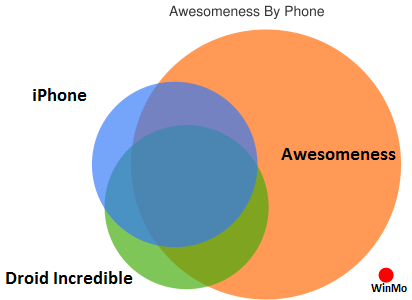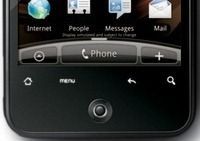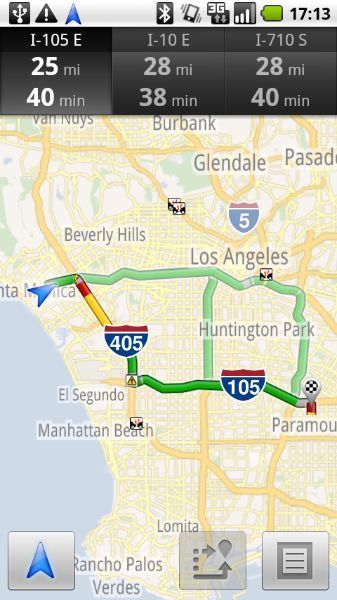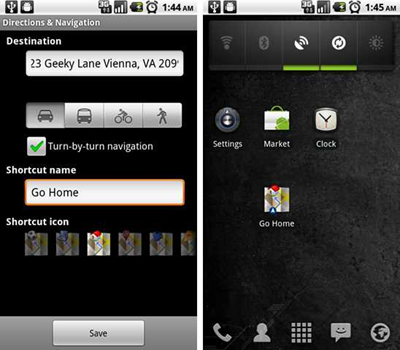What I Miss From My Android as a New iPhone User
If you’re just joining us, this is part two of my “OMG I just got an iPhone” series. You can read about what I love about the iPhone in the previous post. While preparing this post, I realized that I’ put together a nice overview of the awesomeness of Android 14 months ago. That post is still pretty valid and worth a read. I have a great chart over there that bears repeating:

That is, whether you go with Android or iPhone or whatever, these are overwhelming amazing devices. Any critique herein is admittedly just nitpicky. We are living in a very exciting time.
(Note: “WinMo” refers to pre-WindowsPhone7 stuff. WinPhone7 was brand-spanking new back then and I have zero experience with whatever’s new these days in the Windows world. Please don’t assume that I’m knocking the MS offerings by omission or at all, I just haven’t used them.)
OK, let’s go.
What I Miss From My Android as a New iPhone User
(In no particular order.)
Identity Management
When you setup an Android phone, you have to tie a Google account to it, just like an iPhone requires an Apple ID. Where Android one-ups iPhone is by letting you use this identity to sign in to other apps. This means that I setup my Google account once, but then just say, “yep, use that one” when I launch Gmail, Reader, News, Voice, Plus, etc. without typing in my password again.
Typing passwords is really a big part of it. I feel like I have to type my login info all-the-damn-time on my iPhone. Since I have long, random passwords (thanks, LastPass!), this is a bit of a pain.
I think the next big thing in tech is going to be a ridiculously simple to use, and comprehensive approach to identity and its related attributes. The burden is just growing to be too much to put it off much longer. You hear that Microsoft? Google? Facebook? Apple? Get on it!
Fewer Password Prompts

A tad more on this, because it’s really annoying. Why do I have to enter my password to install apps? Why when I update apps? Feel free to ask for a pin or password when money’s involved, but otherwise I feel like I’m authenticating myself waaaay too much.
This is something that strikes me as a very “un-Apple” thing to do. The company that insists that two mouse buttons is too complicated doesn’t strike me as the company that ought to make updating my apps so hard. Actually, apps (optionally) update automatically on Android—I miss that.
A “Back” Button

Android phones typically have four buttons vs. iPhones “home” button. I’ve complained in the past about these buttons being in frustratingly inconsistent order between vendors, but I do like them. Of those buttons, I miss the back button the most. It pops the stack and takes you to whatever you were just looking at. As you pop around between apps, open links, etc., tapping back would intuitively rewind your experience.
The comparable experience on iPhone is less than ideal. It goes like this:
- While looking at some content, click a link or a notification
- Something else opens, do whatever you want with it
- To return to what you were doing before clicking the link or the notification:
- Double-tap the home button and tap the app you were using
It’s not a huge deal, but it’s three taps and a tiny bit of extra mental energy to do something that’s just one brainless tap on Android. I can’t imagine how annoying this must have been on iPhone before the multitasking stuff was released.
Google Voice Integration
This is a big one for me. I love Google Voice. I’ve used it extensively for years, to the point where I honestly have lost track of my actual phone number (I only know and share my GV number). GV integrates fully into Android and it is awesome. Texting, calling, etc. all seamlessly work through my GV number without a second thought on Android.
The iPhone experience is weak in comparison. I can dial and text, but only from the GV app. The native dialer and iMessage app don’t consider GV at all, which means that other apps that dial and text (tapping on numbers in any other app, or doing speech-driven stuff with Siri) don’t use my Google Voice number.
Apple, you can keep your visual voicemail, ok? Google Voice is way, way better and does so much more.
Related: does anyone have personal experience with better integration via jailbreaking (there’s hope!)?
Third-Party Apps as First Class Citizens
Google Voice is my token example of how Android lets third party apps really integrate well if you want them to, but the truth is, that power is available to every app. The way Android does it is pretty slick, too.
Imagine if you will, the web browser. You’ve been using it for months when suddenly, for whatever reason, you install a different one.The first time you click on a link that would normally open the default browser, you’ll see this:
Sharing
I really like how Android handles sharing. In any app that has content you want to share with another app, you just hit “share”, and up pops a menu of places it can go. The share-to list is populated by whatever apps can accept your content so integrating with everything is really easy. On iPhone it seems like you have to either wait for Apple to build in support for sharing via individual services (e.g. Twitter), or go to the destination app first and then load the item to be shared from there.
I do admit that iPhone’s strict control over this means that the hand off is more sophisticated and little slicker, but I really miss the open-for-business approach Android takes in letting any app list itself on the share menu.
Better Google Apps
While apps in general are better in the iPhone universe, Google’s apps are the exception. I’ve found that Google not only releases more apps for Android than iPhone but they also come out more quickly and seem to be of higher quality.
Take Gmail as an obvious example. iPhone’s native email client supports Gmail, but if you do that you don’t get push notifications. Gmail gets around that by pretending to be an Exchange Server, so you can get push, but then you lose much of what makes Gmail awesome.
The Gmail app on Android is fantastic, but isn’t available on iPhone (as I write this, Google has released, and then pulled their Gmail app from the iPhone App Store—it’ll be back soon, but it’s literally years behind).
I also miss Google Talk. Are there any decent Google Talk apps for iPhone?
Oh and for star gazing, Google Sky Map is very impressive.
Better Development Experience
I don’t have a lot of experience with mobile development on either platform, but what little I do have leaves me loving Android development more than iPhone development. The objective-c stuff I played around with really melted my brain. Plus, provisioning and deployment was very tricky on iPhone. When playing around on my Droid, this stuff was easy, and without an NDA to worry about, people are much more talkative about it. All that talking means there’s a wealth of information out there to help.
To be fair, I have a lot of experience with programming that’s more similar to Android’s Java than iPhone’s Obj-C, but still. I think the fact that an industry is growing up around iPhone app development to let you build apps in anything but obj-c suggests that the iPhone platform is simply more difficult to work with.
Flash (But Just Barely)
This one almost didn’t make the list. Flash on Android is rarely a pleasant experience but there have been a few times where I wouldn’t have been able to get the info I needed without it. This is really a shame-on-you to the site owners that don’t have mobile-friendly versions of their sites, but the fact is, at least running flash was an option on my droid.
Tinkerer Friendly
I’m a life long tinkerer. One of my favorite things to do when I was little was to disassemble old electronics (phones, VCRs, computers, etc.) and then imagine how all the magical pieces inside worked. This led directly to my career in engineering (I actually know how some of that stuff works now!).
Android was very compatible with my tinkerer-inclined mind. I could dig around in the OS files, write quick and dirty apps, attach a debugger, root it, install various roms, etc. I know you can do a lot of that on iPhone, but with Android it’s all encouraged and seems much more accessible.
Cheaper/Standardized Accessories
While I do love the solid, versatile dock connector, I don’t love that everything that plugs into it costs $25. And if you do consider cheap chargers and cables, you have to wade through hundreds of one-star reviews about how a $6 piece of wire caused someone’s house to burn down and his dog to run away.
Luckily I don’t have to buy these but once! That is, unless Apple decides to change the beloved dock in such a way that all my old accessories stop working with newer devices…again :(.
Most Droids simply use a micro USB connection. This was great as it meant Wife and I could share chargers for our phones, Kindles, and Bluetooth headsets. And the chargers and cables were dirt cheap.
Navigation

One of the unsung heroes of the Android OS has got to be navigation. Yes, Maps is great (another example of Google’s apps being better on Android), but Navigation is amazing. It’s, by far, the best GPS navigation implementation I have ever used.
It’s fully integrated with Google Voice Actions, too (kind of like iPhone’s Siri) so I would routinely say things like this while driving, “navigate to Target/BestBuy/Dunkin Donuts/Natatorium in Some City” and it just works.
It is beautiful, fast, intuitive, and very effective. (It does kill the phone’s battery, though…)
Shortcuts

Shortcuts are one of the things I bet almost nobody uses, but they are great. You can add shortcuts to you home screen for apps, sure (Android normally keeps apps in a drawer, not on the home screen), but also for common actions like navigating to a specific address (home, work, etc.), calling someone, or playing a song. Having single-tap access to common actions is pretty great.
Conclusion
Like I said before, having so much computing power, and so much access to information available to us at all times is pretty amazing—all modern smart phones enable that. It’s great that we have so much competition in this space, too, as it will only serve to improve each platform.
I love where these things are heading and count myself lucky to have only first world problems like these to personally blog about :)
Any other switchers out there?